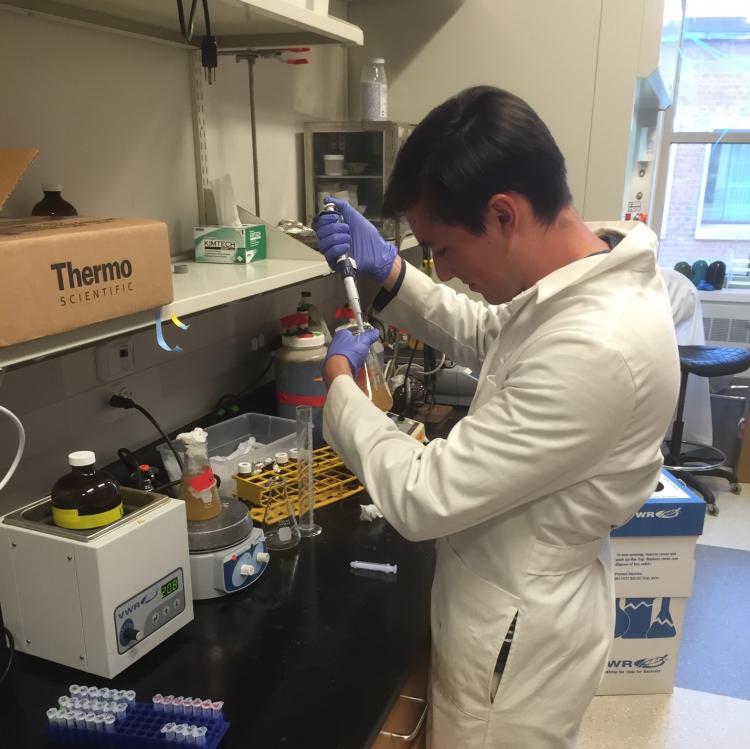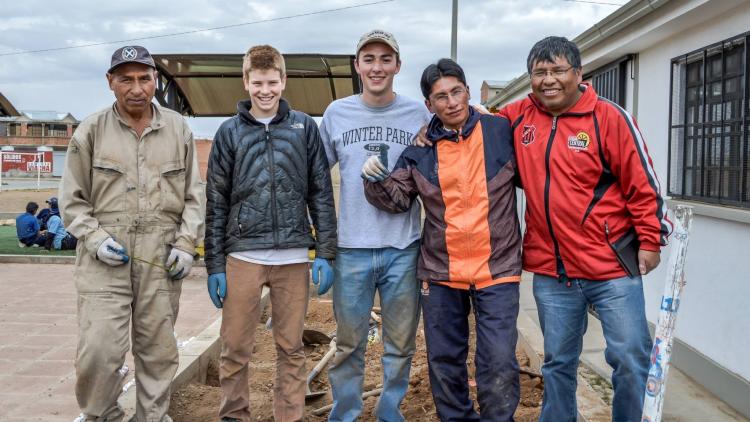2017 CEC Silver Medal Awardee: Bridger Ruyle

At CU Boulder, I am involved in the Global Engineering RAP, the Engineering Honors Program, and the Presidents Leadership Class. I work in Dr. Karl Linden’s lab and for the Intermountain Oil and Gas Best Management Project through the law school. I volunteer with “I Have a Dream” Foundation of Boulder County and New Vista High School.
I like running, skiing, and doing the New York Times crossword. A fun fact is that before engineering consumed my life, I won the state competition in piano. My favorite things about Boulder are the running trail on CU Boulder South along South Boulder Creek and Sherpas.
Congratulations on the 2017 CEC Silver Medal Award! You are the first EVEN student at CU Boulder to win this award, what do you think made you stand out from other potential candidates?
Winning the Silver Medal Award is a great honor. I am very thankful to the Colorado Engineering Council and my faculty recommenders, including Dr. Karl Linden and Dr. Mike Walker of the EVEN program.
One reason I think I stood out was the range of experiences and activities I have been involved in at CU. In engineering, I have been involved in both the Global Engineering RAP and the Engineering Honors Program, leading many events for Global and TAing for classes in both programs. I have also worked in Dr. Linden’s lab. Outside of engineering, I have participated in student government, worked for the law school analyzing oil and gas contracts, and spent a summer in Bolivia building urban gardens on a UROP grant.
From the interview, I could tell that the committee members highly valued community service. Since my freshman year, I have volunteered as a tennis coach with the “I Have a Dream” Foundation of Boulder County. I have also volunteered for two years as a math and science tutor for English as second language students at New Vista High School. I think my long-term volunteering also helped me stand out from the other candidates.
Finally, it is important to mention that the Colorado Engineering Council’s purpose is to represent all of professional engineering societies in our state. They are strong proponents of obtaining licensure. This semester, Dr. Corwin and Dr. Walker have dedicated several classes in senior design to reviewing and preparing for the FE. These review questions not only helped me in passing the FE earlier this semester, but also came up in the interview!
What area of Environmental Engineering are you most interested in? Why is this important to study?
I am most interested in environmental chemistry. More specifically, I am interested in the chemistries of pollutants in aquatic and biological systems. This field is important to study because so many people are affected by this kind of pollution, from Flint to Bangladesh. I believe we have an ethical obligation to study pollution and its harmful effects because it is the result of our own choices—energy, food, policy, etc. As environmental engineers, we have enormous power to impact billions of people and future generations by developing treatments, preventative methods, and remediation options to clean up the environment.
What research are you working on with Professor Karl Linden?
I have worked for Dr. Linden for two and a half years researching the characterization and treatment of fracking wastewater. The project is part of the larger AirWaterGas initiative funded by the National Science Foundation exploring the effects of natural gas development on the environment in the Rocky Mountains. My lab experiences are diverse, from collecting water samples in Eastern Colorado to using the mass spectrometer. Recently, I have been running experiments using microbes from the Boulder Wastewater Treatment Plant acclimated to high salinity environments to see how effective they are at degrading organic carbon in the fracking wastewater. It is important to study low-cost treatment options because it is currently more economic to dispose of this water in deep injection wells rather than treat it. Every drop of water is precious, especially in our state.
How did you get involved with this research and what have you learned from this opportunity?
At the beginning of my sophomore year, I decided I wanted to get involved in research. At this point, I was still a chemical engineering major, but had heard of Dr. Linden’s work from another professor. I spruced up my resume and sent him an email asking him if he had any opportunities to work in his lab. And I didn’t hear back. So, I sent him another email. This time I got through and found myself working in the lab the next month! At first, lab work consists of shadowing other people and cleaning up. It can be pretty boring. But through these small tasks, I began to learn some fundamentals that they don’t teach in classes, such as how to use a pipet or how to calibrate a turbidimeter. Once I knew the fundamentals, I start taking on more and more responsibility, performing my own experiments and analyzing data.
The most important thing I learned from working in the lab is that I am an environmental engineer, not a chemical engineer. I switched my major to environmental engineering with a focus in energy after just one semester with Dr. Linden and have never regretted it. I have also been exposed to an aspect of fracking that many people don’t think about. I am continually conflicted about the industry as a whole, but strongly believe in the importance of environmental engineers working to mitigate some of its detrimental environmental consequences.
What is your most memorable experience during your time at CU?
In years to come, I will always think about the Global Engineering RAP when I think of CU. The community in Kittredge Central was my home for three years and was where I met my best friends. I was part of the first group of students in the program. Over the years, the program has grown along with me. I have had many opportunities to lead my peers on two camping trips up 14ers, Spanish dinners to Rincon Argentino, and recitations for the RAP class “The Meaning of Information Technology.” I have also had the opportunity to learn salsa dancing and philosophy from them. This program, where students from across the college and the world live with and support each other, is incredibly special.
As you are a senior engineering student, what are your plans for after graduation?
Starting in August, I will enroll at Harvard University to pursue a PhD in Environmental Science and Engineering. I plan to study emerging water quality and public health issues in developing communities associated with manufacturing, energy production, and climate change. Billions of people lack access to the quality of water we enjoy in Boulder and around the United States. This problem becomes more complex as polluting industries relocate to their communities and with climate change. I am excited to study at Harvard because of their faculty, caliber in environmental sciences and public health, and location in Cambridge, Massachusetts.



